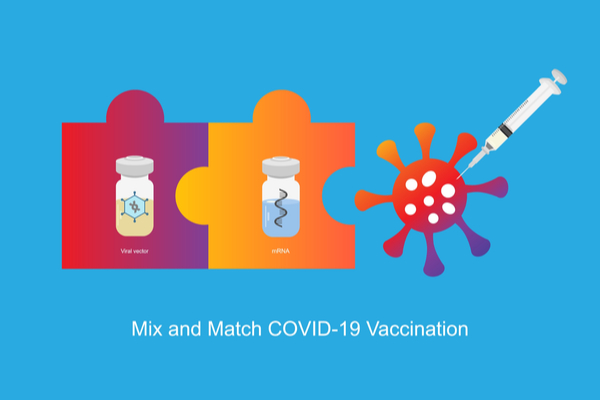If you’ve been fully vaccinated against COVID-19, is it OK to switch to a different manufacturer’s product for your booster dose? If you ask the US Food & Drug Administration (FDA), the answer is yes. Under a newly announced “mix-and-match” strategy, people who got a Pfizer Bio N Tech, Moderna, or Johnson & Johnson (J&J)/Janssen COVID vaccine may switch to another brand’s booster.
After reviewing available data, the FDA concluded that “the known and potential benefits” of using a single mix-and-match, or “heterologous,” booster dose outweigh “the known and potential risks’ in people eligible for boosters. The US Centers for Disease Control and Prevention (CDC) has yet to revise its guidance. The CDC’s Advisory Council on Immunization Practices is slated to hear a presentation on mix-and-match data during its October 21 meeting.
So, if you’re looking for a booster dose, what should you do? Here’s the latest on the FDA’s mix-and-match approach.
Mixing vaccines has a couple of advantages. From a practical standpoint, the ability to switch from one manufacturer’s vaccine to another gives Americans more flexibility when they go to the doctor’s office or a pharmacy for a booster shot. “This is going to give them some of that flexibility to go ahead and get boosted with what is convenient, whether that’s what their physician might have in their office or what the local health department or vaccine clinics may have,” Eric Adkins, MD, a professor of emergency medicine and critical care at the Ohio State University Wexner Medical Center, said in an interview with Health magazine.
It would also extend an opportunity for people who received the one-dose J&J vaccine to “boost” with one of the mRNA (Moderna of Pfizer) vaccines if they so choose. A recent CDC study examined “real world” data from mid-March through mid-August on COVID vaccine effectiveness. The two-dose Moderna and Pfizer regimens were 93% and 88% effective, respectively, against COVID hospitalization, the study found, while the single-dose J&J vaccine had a lower level of protection, at 71%.
There’s some thought that mixing vaccines might provoke a more powerful immune response. That’s partly based on results of a small, pre-print study not yet peer reviewed) on mix-and-match booster vaccination. Nine groups of about 50 people each participated in the study. Adults who had received one of the three COVID vaccines cleared for use in the US—Moderna, Pfizer, or J&J—were then given a booster of one of those three same vaccines.
Preliminary findings indicate that mixing and matching, regardless of the combination of vaccines and boosters, increased antibody levels, according to the New York Times. Of particular note were the results for J&J vaccine recipients: switching to a Pfizer booster resulted in a 35-fold increase in antibody levels, while those who got a Moderna booster had a 76-fold rise in antibodies. But the study has limitations, including its small size and short follow-up period, which may not capture rare side effects.
Each of the COVID-19 vaccines may be given as a booster dose to eligible adults who’ve completed a different COVID vaccine. The FDA lays out a couple of scenarios for you to consider.
First, let’s say you had J&J. If you’re 18 or older, you could go with the J&J booster, or you could get a shot of Moderna (which, for booster purposes, is a half-dose) or a shot of Pfizer. In each case, you’ll have to wait at least two months after getting the primary J&J shot.
If you got Moderna or Pfizer and you fall into one of the categories of people authorized to get a booster, you have a choice too. You can get the same brand, you can switch to the other mRNA option, or you get J&J. Regardless of which one you choose, you’ll have to wait at least six months after you’ve completed the two-dose primary vaccine regimen.
Paul Goepfert, MD, director of the Alabama Vaccine Research Clinic at the University of Alabama at Birmingham, suspects that switching from one vaccine to another will be safe. But based on the data he’s seen, “there’s really no big advantage to mix-and-matching,” he says.
Whichever booster you get, rest assured that vaccination is highly protective against severe disease and hospitalization. “I think these vaccines are so fantastically good that you that you can do whatever you want, and it’s going to work,” says Dr. Goepfert.
—
Photo Credit: Teeradej / Shutterstock.com
